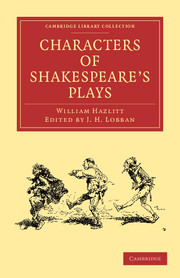Book contents
- Frontmatter
- Preface
- Contents
- Introduction
- Preface
- Cymbeline
- Macbeth
- Julius Cæsar
- Othello
- Timon of Athens
- Coriolanus
- Troilus and Cressida
- Antony and Cleopatra
- Hamlet
- The Tempest
- The Midsummer Night's Dream
- Romeo and Juliet
- Lear
- Richard II
- Henry IV
- Henry V
- Henry VI
- Richard III
- Henry VIII
- King John
- Twelfth Night; or, what you will
- The Two Gentlemen of Verona
- The Merchant of Venice
- The Winter's Tale
- All's Well That Ends Well
- Love's Labour's Lost
- Much Ado About Nothing
- As You Like It
- The Taming of the Shrew
- Measure for Measure
- The Merry Wives of Windsor
- The Comedy of Errors
- Doubtful plays of Shakespear
- Poems and Sonnets
- Notes
Much Ado About Nothing
Published online by Cambridge University Press: 07 September 2010
- Frontmatter
- Preface
- Contents
- Introduction
- Preface
- Cymbeline
- Macbeth
- Julius Cæsar
- Othello
- Timon of Athens
- Coriolanus
- Troilus and Cressida
- Antony and Cleopatra
- Hamlet
- The Tempest
- The Midsummer Night's Dream
- Romeo and Juliet
- Lear
- Richard II
- Henry IV
- Henry V
- Henry VI
- Richard III
- Henry VIII
- King John
- Twelfth Night; or, what you will
- The Two Gentlemen of Verona
- The Merchant of Venice
- The Winter's Tale
- All's Well That Ends Well
- Love's Labour's Lost
- Much Ado About Nothing
- As You Like It
- The Taming of the Shrew
- Measure for Measure
- The Merry Wives of Windsor
- The Comedy of Errors
- Doubtful plays of Shakespear
- Poems and Sonnets
- Notes
Summary
This admirable comedy used to be frequently acted till of late years. Mr Garrick's Benedick was one of his most celebrated characters; and Mrs Jordan, we have understood, played Beatrice very delightfully. The serious part is still the most prominent here, as in other instances that we have noticed. Hero is the principal figure in the piece, and leaves an indelible impression on the mind by her beauty, her tenderness, and the hard trial of her love. The passage in which Claudio first makes a confession of his affection towards her, conveys as pleasing an image of the entrance of love into a youthful bosom as can well be imagined.
“Oh, my lord,
When you went onward with this ended action,
I look'd upon her with a soldier's eye,
That lik'd, but had a rougher task in hand
Than to drive liking to the name of love ;
But now I am return'd, and that war-thoughts
Have left their places vacant; in their rooms
Come thronging soft and delicate desires,
All prompting me how fair young Hero is,
Saying, I lik'd her ere I went to wars.”
In the scene at the altar, when Claudio, urged on by the villain Don John, brings the charge of incontinence against her, and as it were divorces her in the very marriage-ceremony, her appeals to her own conscious innocence and honour are made with the most affecting simplicity.
- Type
- Chapter
- Information
- Characters of Shakespeare's Plays , pp. 223 - 227Publisher: Cambridge University PressPrint publication year: 2009First published in: 1908

